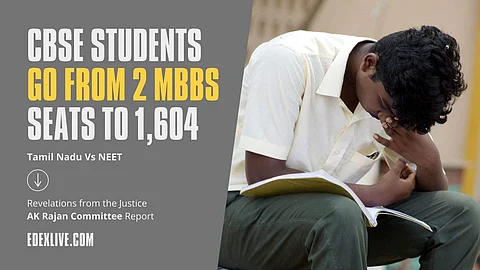

Has NEET overly favoured the CBSE students over students who studied in Tamil Nadu's state board schools? Data compiled by the High-Level Committee To Study The Impact of NEET on Medical Admissions in Tamil Nadu suggests so. According to the report, the number of CBSE students who secured admissions in TN's medical colleges has exponentially increased after the inception of NEET — from a meagre 2 students in 2015-16 to a staggering 1,604 in 2020-21.
It also noted that the percentage of CBSE applicants too have increased multi-folds, but the number of applicants who have studied in state-board schools has reduced exponentially, since 2017 (the year in which NEET was introduced). "Between the pre-NEET and post-NEET periods, the rate of the applicants who are TNSBSE students has radically decreased from approximately 95 per cent in the pre-NEET period to 64.27 per cent in 2020-21 as opposed to an exponential increase in the surging applicants of CBSE (from an average of 3.17 per cent pre-NEET to 32.26 per cent in 2020-21). This shows that the percentage of the TNSBSE students applying for admission in MBBS fell down by approximately 30 per cent but that of the CBSE students increased by 31 per cent," says the report compiled by the committee headed by former Madras HC Judge AK Rajan.
Picture this. In the academic year 2010-11, Tamil Nadu had a total of 2,349 medical seats. State board students occupied 2,332 (99.27 per cent) of them. CBSE students, on the other hand, had 14 seats. In 2016, of the 3,608 seats, state board students bagged 3,544 (98.2 per cent) of the seats, while CBSE students landed 35 seats (0.97 per cent). However, the percentage seat share of the former dipped so much so that, in 2019-20, state board students only had 65.7 per cent of the seats. The next year, it came down to 59 per cent (plus the additional 7.5 per cent seats reserved for government school students).
"It is evident from the results that it (NEET) is CBSE biased, as the results have consistently proved that the students from the CBSE stream have secured MBBS seats as high as 26.83 per cent in 2020-21 from 0 per cent in 2015-16 in government medical colleges and 12.01 per cent in 2020-21 from a negligible 0.07 per cent in 2015-16 in Self-financed colleges in this high stake exam," the report reads.
Now, what could the reason behind this be? The report says that NEET seemingly duplicates the CBSE board examinations and uses the same criteria to assess students. "It should be noted that the NEET syllabus is based on the CBSE syllabus. As India is a diverse country with so many boards of education that have different syllabi, a common entrance exam is not applicable to all. NEET is paving the way only for students who are economically advanced, studying in CBSE schools and spending lakhs for their private school education and coaching classes," the report says.
The report by the Tamil Nadu government's high-level committee headed by retired Judge AK Rajan on the impact of NEET in medical admissions in Tamil Nadu was made public on September 20. The 165-page report, which was submitted on July 14 criticises NEET and seeks its immediate ban in Tamil Nadu.
At the same time, Dr G R Ravindranath, General Secretary, Doctors' Association for Social Equality and a member of the committee said that NEET is totally against the students from Tamil Nadu and that the centre should work along with the state to ban it completely. "The centre has to agree to this demand and must amend its NMC bill to facilitate the ban of NEET in Tamil Nadu. Additionally, there must be a provision for states that are against the examination to raise their voice," he said.
